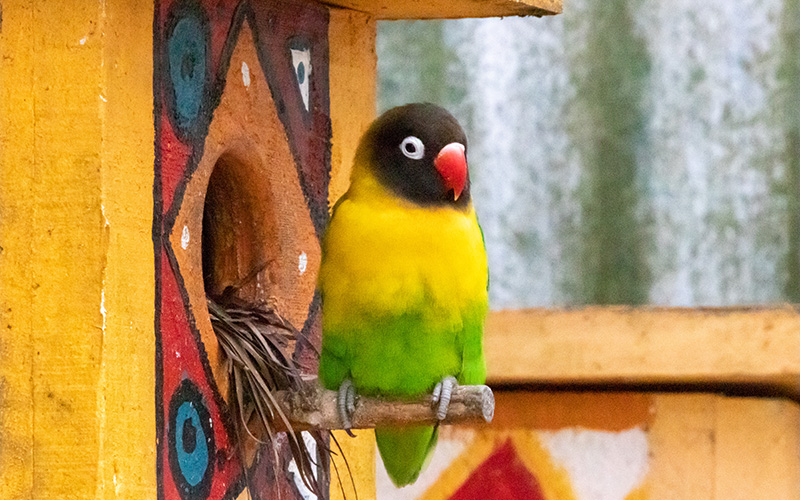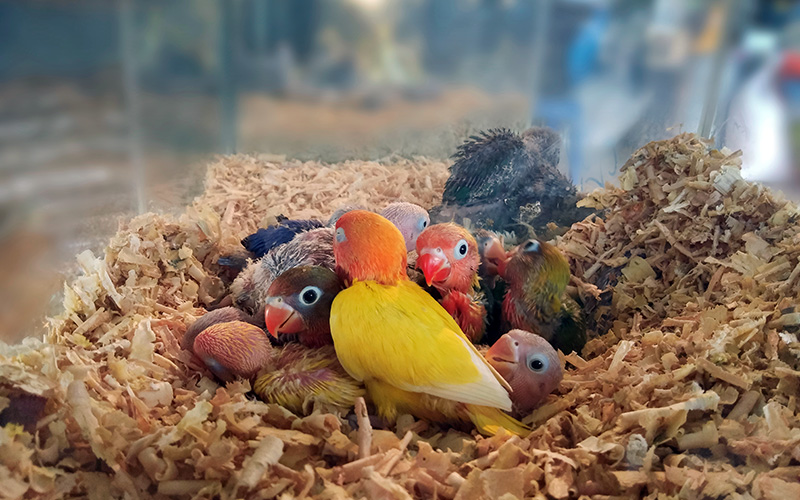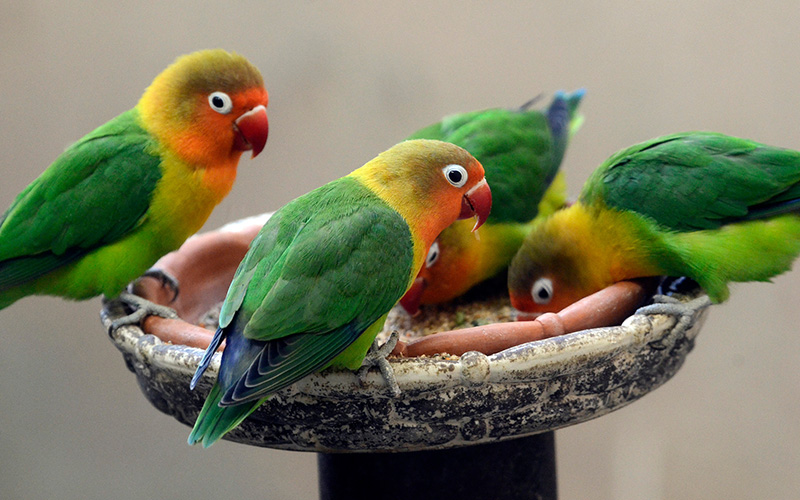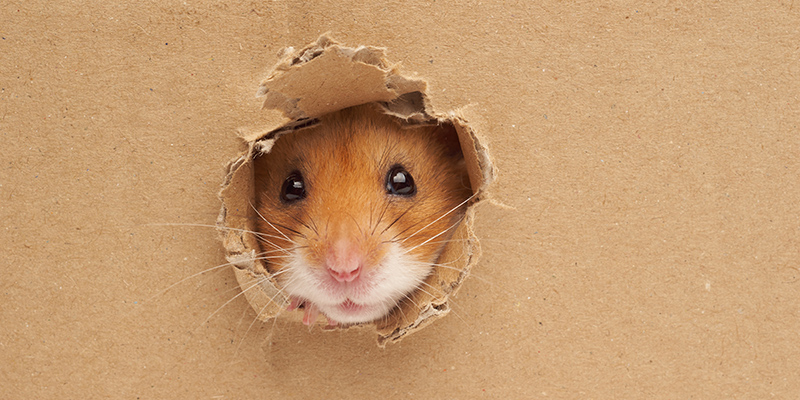Have you ever imagined a scenario where two lovebirds fight with one another? Perhaps not. That’s because they’re among the world’s most popular and well-loved pet birds.
These feather-colorful creatures can become pets as they’re pleasant, intelligent, and loving. However, prospective lovebird owners should be aware of the territorial behavior resulting in fights and the potential for harm to both themselves and other birds.
If you plan to get these amazing birds as your pet, it’s essential to understand their nature to give them the best care possible. Let’s cover the causes of their behavior, the species more likely to exhibit it, and the prevention tips you can follow.
What Triggers Lovebirds to Fight?

So, why do lovebirds fight in the first place? Let’s explore some possible causes, shall we?
During the breeding season, lovebirds are known for fiercely defending their territory. If they feel their habitat is threatened, they may become hostile toward other birds, even their mates. They would shrill, screech, bite, or even attack other birds!
An owner can alleviate territorial disputes between lovebirds by setting up a large cage with many toys and perches. Owners should consider providing separate cells for pairs to prevent aggression toward other birds.
Do Female Lovebirds Fight?
Yes! They do, especially when trying to protect their nest and chicks.
For lovebirds to thrive as pets, it’s imperative to comprehend their territorial temperament. They need a lot of space to play and interact with their owners and an area to call theirs.
Owners can aid in preventing conflicts and fostering a harmonious relationship by ensuring the lovebirds have a cozy and secure living cage.
Lovebirds Are Quite the Jealous Type
They quickly feel jealous of other birds and even other people. They can become fiercely devoted to and protective of their partners as well.
Different behaviors can result from lovebirds’ jealousy. They might become upset when their favorite person interacts socially with others or animals. They feel the love diverted from them and become hostile toward other birds or mates.
Is It Normal for Lovebirds to Fight?
While it’s pretty normal for lovebirds to get engaged in disagreements, especially when it’s mating season, it’s never normal for these animals to engage in a heavy fight. This is a clear sign of aggression and, perhaps, lack of socialization.
As an owner, if you notice intense fighting from your lovebirds, it’s important to give each bird attention and social interaction. Spending time with each bird one-on-one can lessen rivalry and aggression toward other birds.
Having a lot of toys and things to do can also help avoid boredom and anxiousness, which can result in jealousy and aggressive behavior.
Will Lovebirds Fight Each Other?
It’s not uncommon for lovebirds to fight each other, especially when they undergo hormonal changes during the breeding period. It’s a typical time when jealousy tendencies and territorial demeanor magnify.
How to Stop Lovebirds From Fighting During the Breeding Season?
You must provide a separate yet cozy living space for pairs during these times. It’s a suitable setup that helps prevent aggression towards other birds and even their chicks.
Similar Genders Can Trigger Lovebirds to Fight
Lovebirds love to socialize and can form strong bonds with their mate. But when you put lovebirds of the same gender, it may trigger them to fight. It’s frustrating for bird owners as predicting when and why fights could occur is challenging.
Do Male Lovebirds Fight?
Yes, and it’s precisely due to the hormonal bursts they experience during mating season. They want to express their dominance in the community and challenge other male lovebirds.
Do Male and Female Lovebirds Fight?
Yes, it’s actually rooted in their survival instincts and territorial characteristics. They’ll attack if they perceive the other birds threatening their food sources, space, and attention.
Lovebirds Can Kill Each Other
There’ve been cases where love birds kill each other. These circumstances mainly occur when they’re placed inside an already overcrowded cage. When that’s their living situation, they’ll feel agitated and stressed, leading to brutal fights.
There are various reasons why this can happen. It can be caused by resource competition, aggression related to breeding, stress, and territorial disputes.
The most common signs of aggression in lovebirds include biting, lunging, hissing, and puffing out their feathers. If left unchecked, an attack can quickly escalate into fighting and, eventually, killing.
As a bird owner, consider planning the best living space for them. It’s the most effective precaution to prevent them from hurting each other.
Some lovebirds become too fierce and aggressive and kill their chicks!
Why Do Lovebirds Kill Their Babies?

It’s a sad reality attributed to the bird’s desire to ensure the strongest offspring survive.
If the female lovebird feels inadequate resources for her chicks or nesting materials, they’ll kill their offspring. Another reason they’d kill their chicks is that they see it as a health problem and perceive it as a weak link.
Male and predominantly female lovebirds can feel easily stressed when nesting and don’t want to be disturbed. It triggers them to turn against their babies and kill them.
Other cases are usually due to a lack of experience. It’s a common case for first-time parents. They could unintentionally harm their chicks by biting too hard when feeding or stepping on them.
If the parents are becoming aggressive towards their offspring, consider separating them. It’s only temporary until the young chicks become strong enough to defend themselves.
Being Prepared When Lovebirds Fight
It’s essential to understand why lovebirds fight, as it could be their natural behavior caused by particular triggers. To prevent fights between lovebirds, provide them enough space and separate cages if necessary. Ensure they have plenty of toys and activities to keep them occupied. Avoid placing too many lovebirds together in the same enclosure.
If you suspect same-gender aggression or territorial disputes, it may be necessary to separate the birds.
Providing a balanced and nutritious diet for your lovebirds is also essential. Consult your veterinarian or bird behavior specialist may be necessary to address any severe aggression or aggression-related issues.
Understanding the nature of these lovebirds and why they fight is very important in caring for them. As an owner, it can help you give these beloved pets a much better quality of life.
You Can Also Read These:
- How To Calm Dog Anxiety Naturally: Calming Your Anxious Furry Pal
- How To Care For Hamsters: Read This Before Getting One
- How To Organize A Pet Parade, It’s Time For Your Pet To Shine




